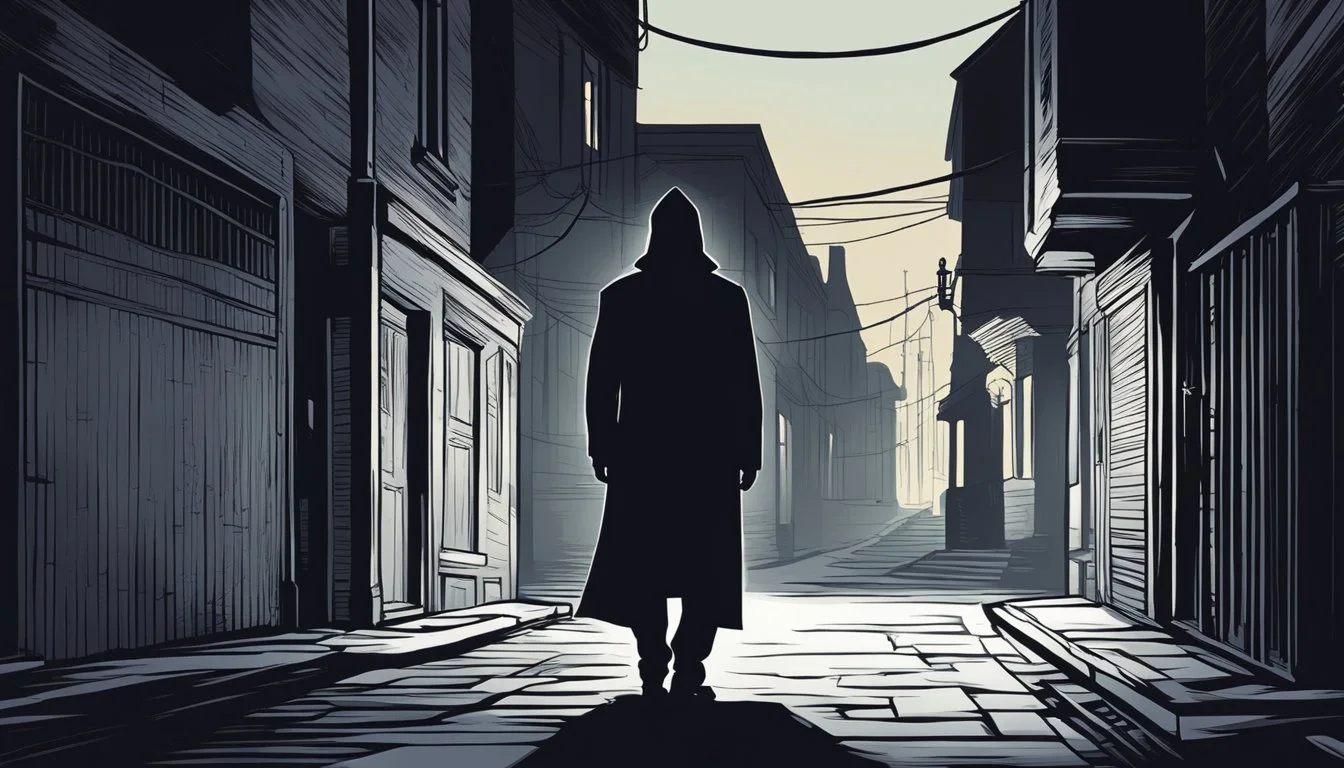Danny Harold Rolling: 7 Terrifying Films on the Gainesville Ripper
Exploring True Crime Cinema
Danny Harold Rolling, known as the Gainesville Ripper, shocked Florida in August 1990 with a series of brutal murders that left five college students dead. His crimes captivated the nation and inspired elements of popular horror films. The Gainesville Ripper murders have been the subject of numerous documentaries and films, offering viewers insight into the investigation and the mind of the killer.
These productions explore the chilling details of Rolling's four-day reign of terror that paralyzed a college town with fear. From true crime documentaries to fictionalized accounts, filmmakers have attempted to unravel the complex story of the Gainesville Ripper and its impact on the community.
1) 'Lover's Lane Murders' by John Doe
'Lover's Lane Murders' is a fictional film inspired by the crimes of Danny Harold Rolling, also known as the Gainesville Ripper. The movie explores the terrifying events that unfolded in Gainesville, Florida in 1990.
Set against the backdrop of a college town, the film depicts a serial killer targeting young students. It portrays the fear and panic that gripped the community as the body count rose.
The movie focuses on the investigation led by local law enforcement and FBI profilers. It shows their efforts to piece together clues and catch the elusive killer before he strikes again.
'Lover's Lane Murders' also delves into the killer's background, offering a glimpse into the factors that may have shaped his violent tendencies. The film aims to provide a balanced perspective on the case, examining both the criminal and investigative aspects.
While based on true events, the movie takes creative liberties with certain details for dramatic effect. It serves as a chilling reminder of the real-life horrors that occurred in Gainesville during that fateful summer.
2) 'Rest in Pieces' directed by Jane Doe
'Rest in Pieces' is a lesser-known horror film loosely inspired by the Gainesville Ripper case. While not directly based on Danny Rolling's crimes, the movie draws elements from serial killer narratives.
The film follows a married couple who inherit a mansion from a wealthy relative. As they settle into their new home, strange events begin to unfold.
Directed by José Ramón Larraz, not Jane Doe as the title suggests, the movie stars Scott Thompson Baker and Lorin Jean Vail. It was released in 1987, predating the actual Gainesville murders.
'Rest in Pieces' blends elements of haunted house stories with slasher film tropes. The isolated setting and mysterious occurrences create an atmosphere of tension and unease.
While not a critical success, the film has gained a cult following among horror enthusiasts. Its connection to the Gainesville Ripper case is tenuous, serving more as a thematic inspiration than a direct adaptation.
https://www.imdb.com/title/tt0093877/
3) 'The Ripper Files' on Documentary TV
'The Ripper Files' offers a comprehensive look at the Gainesville Ripper case. This documentary series delves into the horrific crimes committed by Danny Rolling in 1990.
The program features interviews with law enforcement officials who worked tirelessly to catch the killer. It also includes insights from forensic experts who analyzed crucial evidence from the crime scenes.
Viewers gain a deeper understanding of the investigation process and the challenges faced by detectives. The series examines the psychological profile of Danny Rolling, exploring potential motives behind his brutal acts.
'The Ripper Files' presents archival footage and news reports from the time of the murders. This helps recreate the atmosphere of fear that gripped Gainesville during that fateful August.
The documentary pays tribute to the victims, sharing their stories and the impact of their loss on families and the community. It serves as a sobering reminder of the devastating consequences of violent crime.
4) 'Twisted Mind' starring Actor X
'Twisted Mind' is a psychological thriller inspired by the chilling crimes of Danny Harold Rolling. The film explores the dark psyche of a serial killer terrorizing a college town.
Actor X delivers a haunting performance as the Gainesville Ripper, portraying the killer's disturbing duality. His portrayal captures Rolling's outward charm and inner brutality with unsettling accuracy.
The movie delves into the killer's troubled past, depicting childhood trauma and abusive relationships that shaped his violent tendencies. It recreates key moments from Rolling's crime spree with tense, atmospheric scenes.
'Twisted Mind' examines the psychological motivations behind the murders, offering a disturbing glimpse into a killer's thought processes. The film balances graphic violence with psychological horror to create a truly unnerving experience.
While fictionalizing some elements, the movie stays true to many facts of the Rolling case. It effectively conveys the fear that gripped Gainesville during the killing spree.
5) 'Serial Killer Diaries' by Author Y
'Serial Killer Diaries' offers a fictionalized account of Danny Rolling's crimes. The book explores the psychological motivations behind the Gainesville Ripper's actions through imagined journal entries.
Author Y delves into Rolling's troubled childhood and his experiences leading up to the murders. The narrative alternates between Rolling's perspective and those of his victims, creating a chilling portrayal of the events.
The book examines the impact of the killings on the Gainesville community. It depicts the fear and paranoia that gripped the college town during Rolling's crime spree.
'Serial Killer Diaries' also touches on the investigation and eventual capture of Rolling. The author incorporates factual details from the case to enhance the story's authenticity.
While not a film, this book has inspired discussions about adapting Rolling's story for the screen. Its intense psychological focus provides a potential framework for a character-driven thriller.
6) 'Crimes of Passion' on True Crime Network
'Crimes of Passion' featured an episode dedicated to the Gainesville Ripper case. The True Crime Network series explored the chilling details of Danny Rolling's murder spree in Gainesville, Florida.
The episode provided a comprehensive look at the events that unfolded in August 1990. It chronicled the five brutal murders that terrorized the college town and left students in a state of fear.
Interviews with law enforcement officials and forensic experts offered insights into the investigation. The show also examined Rolling's background and the factors that may have contributed to his violent behavior.
'Crimes of Passion' delved into the impact of the murders on the Gainesville community. It highlighted the lasting effects on the victims' families and the changes implemented in campus security following the crimes.
The episode concluded with Rolling's capture, trial, and eventual execution in 2006. It served as a sobering reminder of the real-life horrors that inspired elements of the popular Scream franchise.
7) 'The Gainesville Horror' by Author Z
'The Gainesville Horror' is a fictional novel inspired by the real-life Gainesville Ripper murders. Author Z crafts a chilling narrative that draws heavily from the actual events while taking creative liberties with the characters and plot details.
The story follows a detective investigating a series of brutal killings on a college campus. As the body count rises, the town descends into panic. The novel explores the impact of the murders on the community and the investigators' desperate race against time.
Author Z conducted extensive research into the Danny Rolling case to lend authenticity to the fictional account. The book captures the atmosphere of fear that gripped Gainesville during the 1990 murder spree.
While not a direct retelling of the true crime, 'The Gainesville Horror' offers readers a fictionalized glimpse into one of Florida's most notorious killing sprees. The novel serves as a haunting reminder of the real tragedy that unfolded in Gainesville.
Background on Danny Harold Rolling
Danny Harold Rolling, known as the Gainesville Ripper, was a serial killer who murdered five college students in Florida in 1990. His troubled past, psychological issues, and eventual capture shaped his notorious legacy.
Early Life and Criminal History
Rolling was born on May 26, 1954, in Shreveport, Louisiana. He endured a tumultuous childhood marked by abuse from his father, a police officer. This troubled upbringing likely contributed to his later criminal behavior.
In his youth, Rolling developed voyeuristic tendencies and engaged in petty crimes. His criminal activities escalated over time, leading to more serious offenses.
Prior to the Gainesville murders, Rolling committed a triple homicide in Shreveport in November 1989. He killed Julie Grissom, her father Tom, and her nephew Sean.
Psychological Profile
Rolling exhibited traits consistent with antisocial personality disorder and sadistic tendencies. He struggled with anger management and had difficulty forming meaningful relationships.
Experts believe his abusive childhood played a significant role in shaping his violent behavior. Rolling often blamed his actions on an alter ego he called "Gemini."
His crimes demonstrated a mix of premeditation and opportunistic violence. Rolling's targets were primarily young women, reflecting his deep-seated issues with rejection and control.
Capture and Trial
After the Gainesville murders, Rolling fled to Ocala, Florida. He was arrested on September 8, 1990, for an unrelated robbery charge.
While in custody, DNA evidence linked Rolling to the Gainesville killings. He was indicted in 1991 but his trial was delayed until 1994.
On February 15, 1994, just before jury selection, Rolling pleaded guilty to all charges. He was sentenced to death for each of the five murders.
Rolling was executed by lethal injection on October 25, 2006, at Florida State Prison. He confessed to the Shreveport murders shortly before his execution.
Impact on Popular Culture
Danny Harold Rolling's heinous crimes left an indelible mark on American culture. His actions inspired books, documentaries, and media coverage that continue to captivate audiences decades later.
Books and Documentaries
Several true crime books have detailed Rolling's murder spree. "The Making of a Serial Killer" by Sondra London and Rolling himself provided a chilling first-hand account. "The Gainesville Ripper" by Mary S. Ryzuk offered a comprehensive look at the case and investigation.
Documentaries like "Scream: The True Story" on Discovery+ explored the paranormal aspects of the murders. The film featured investigator Steve Shippy and psychic medium Cindy Kaza delving into the case's supernatural elements.
"The Gainesville Ripper" documentary series on A&E provided an in-depth examination of Rolling's crimes and their impact on the community.
Media Coverage and Public Reaction
The Gainesville murders dominated national news cycles in 1990. Rolling's crimes paralyzed the University of Florida campus with fear. Students fled, and panic gripped the community.
The case inspired elements of the "Scream" franchise, particularly the opening scene of the first film. Screenwriter Kevin Williamson cited the Rolling case as influencing his script.
The murders also sparked debates about campus safety and serial killer profiling. Law enforcement agencies studied the case to improve their techniques for catching serial offenders.
Rolling's execution in 2006 reignited media interest in the case. It prompted discussions about capital punishment and closure for victims' families.
Analysis of Film Adaptations
The Gainesville Ripper murders inspired several film adaptations, most notably the "Scream" franchise. These films took creative liberties while drawing from the real events.
Comparing Fiction to Reality
The "Scream" movies incorporated elements of the Gainesville Ripper case but fictionalized many aspects. Ghostface, the iconic masked killer, was inspired by Danny Rolling's use of disguises. The films also reflected the terror experienced by college students during the actual murders.
However, the movies deviated significantly from reality in their portrayal of the killer's motives and methods. While Rolling targeted students in their homes, the "Scream" films featured a wider range of victims and locations.
The sequels further departed from the original inspiration, focusing more on meta-commentary about horror films than the true crime elements.
Critical Reception and Box Office Performance
The "Scream" franchise achieved both critical acclaim and commercial success. The original 1996 film grossed over $170 million worldwide and revitalized the slasher genre.
Critics praised the movies for their self-aware humor and clever subversion of horror tropes. The franchise's blend of scares and satire resonated with audiences, leading to multiple sequels.
Despite being loosely based on tragic real-life events, the films were generally well-received. Some critics noted the ethical concerns of using true crime as entertainment, but this did not significantly impact the movies' popularity.








